
Asuras are a class of beings or power-seeking clans related to the more benevolent Devas in Hinduism.
Hindu deities are the gods and goddesses in Hinduism. The terms and epithets for deity within the diverse traditions of Hinduism vary, and include Deva, Devi, Ishvara, Ishvari, Bhagavān and Bhagavati.

Kurma, also known as 'KurmaRaja' is an avatar of the Hindu god Vishnu. Originating in Vedic literature such as the YajurVeda as being synonymous with the Saptarishi called Kasyapa, Kurma is most commonly associated in post-Vedic literature such as the Puranas with the legend of the churning of the Ocean of Milk, referred to as the Samudra manthan. Also synonymous with Akupara, the world-turtle supporting the Earth, Kurma is listed as the second incarnation of the Dashavatara, the ten principal avatars of Vishnu.
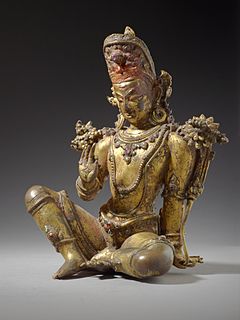
Deva means "heavenly, divine, anything of excellence", and is also one of the terms for a deity in Hinduism. Deva is a masculine term; the feminine equivalent is Devi.

Mahishasura was a buffalo Asura in Hinduism. He is known among Hindus of most sects as a deceitful demon who pursued his evil ways by shape-shifting. Mahishasura was the son of Rambha, and the great-grandson of Brahmarshi Kashyapa. He was ultimately killed by Goddess Durga - after which She gained the epithet Mahishasuramardini. The Navaratri festival eulogizes this battle between Mahishasura and Durga, culminating in Vijaya Dasami, a celebration of his ultimate defeat. This story of the "triumph of Good over Evil" carries profound symbolism in Hinduism, particularly Shaktism, and is both narrated as well as reenacted from the Devi Mahatmya at many South- and Southeast Asian Hindu temples. The story is also told in the Sikh text Chandi di Var, also called Var Durga Di, which many in Sikh tradition believe was included in the Dasam Granth by Guru Gobind Singh.

A daeva is a Zoroastrian supernatural entity with disagreeable characteristics. In the Gathas, the oldest texts of the Zoroastrian canon, the daevas are "gods that are rejected". This meaning is – subject to interpretation – perhaps also evident in the Old Persian "daiva inscription" of the 5th century BCE. In the Younger Avesta, the daevas are divinities that promote chaos and disorder. In later tradition and folklore, the dēws are personifications of every imaginable evil.
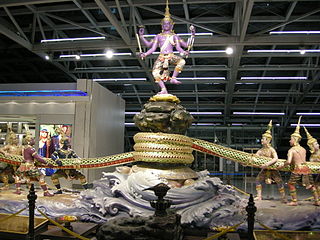
The Samudra Manthana is one of the best-known episodes in the Hindu philosophy narrated in the Bhagavata Purana, in the Mahabharata and in the Vishnu Purana. The Samudra Manthana explains the origin of Amrita, the nectar of immortality and the omnipotent god of destruction Shiva drank the vish.

An asura in Buddhism is a demigod or titan of the Kāmadhātu. They are described as having three heads with three faces each and either four or six arms.

Smerinthus ocellatus, the eyed hawk-moth, is a European moth of the family Sphingidae. The species was first described by Carl Linnaeus in his 1758 10th edition of Systema Naturae.
The Kālakeyas or Kālakhañjas are a class of Asura in Hindu mythology. They were a powerful, ferocious and cruel clan of the Dānavas.
Rhoptropella is a monotypic genus of lizard in the family Gekkonidae. The genus is indigenous to southern Africa.
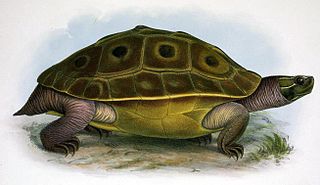
The Burmese eyed turtle, also known as the Bengal eyed terrapin, Burmese peacock turtle or swamp turtle, is a species of turtle in the family Geoemydidae of southern Asia.

Morenia is a genus of turtles in the family Geoemydidae found in India, Bangladesh, and Burma. It contains only these species:

Asura is a genus of moths in the subfamily Arctiinae erected by Francis Walker in 1854.
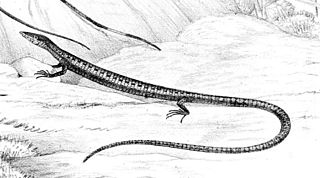
Anadia ocellata, commonly known as the ocellated anadia , is a species of lizard endemic to the Americas.
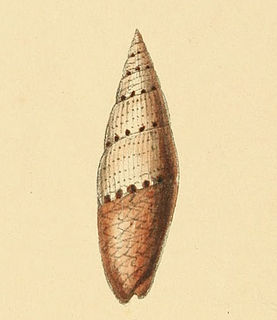
Swainsonia ocellata, common name the eyed mitre, is a species of sea snail, a marine gastropod mollusk in the family Mitridae, the miters or miter snails.

Asura's Wrath is an action video game developed by CyberConnect2 and published by Capcom. Asura's Wrath was first announced at the Tokyo Game Show in 2010, and was released worldwide in February 2012. The game is playable on PlayStation 3, Xbox 360, Xbox One via 360 backwards compatibility, and the PlayStation 4 and PC via PlayStation Now.
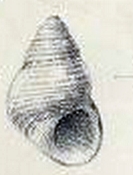
Alcyna is a genus of sea snails, marine gastropod mollusks in the family Trochidae, the top snails.
Ninox boobook ocellata is a subspecies of southern boobook. The southern boobook is the most common and smallest owl on the Australian mainland. The sub species is characterised by its lighter colour than other sub species, and is generally found in a wide range of habitats. Ocellata is the smallest of the boobook subspecies as it is found in the warmer western parts of Australia. although it is not found in arid areas. The Boobook can be commonly known as the ‘mopoke’ due to its call. This owl is often confused with the barking owl due to their similar appearance, however the boobook is a fair amount smaller. The boobook feeds on insects and small vertebrates.

Uromastyx ocellata is a species of agamid lizard native to northeastern Africa. It is known as the ocellated spinytail, eyed dabb lizard, and ocellated uromastyx.













